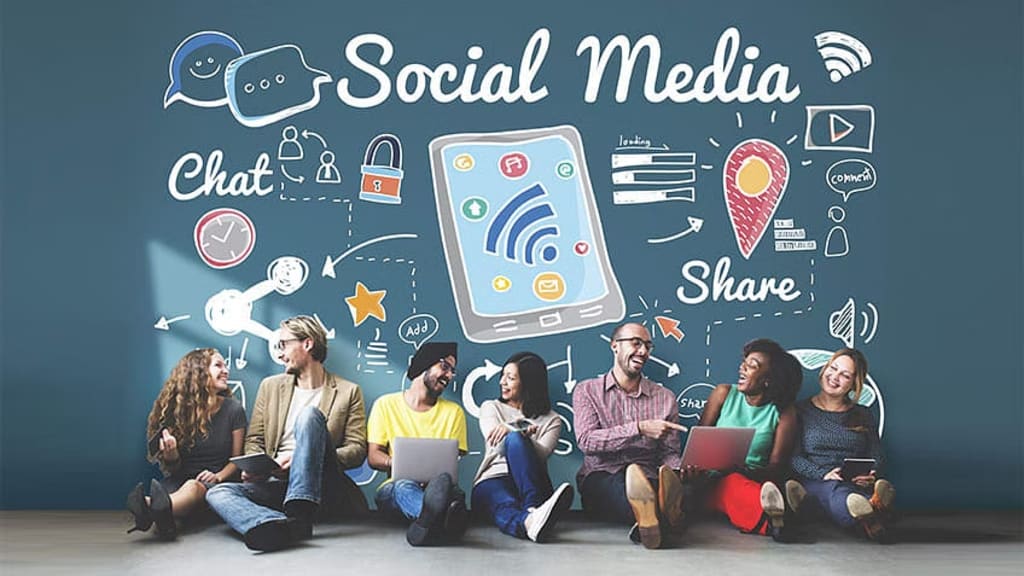SOCIAL MEDIA
Types ,Advantages and Disadvantages

SOCIAL MEDIA
Social media refers to online platforms that allow people to connect, share and exchange information, ideas, and content in a virtual community or network. Examples include Facebook, Twitter, Instagram, YouTube, LinkedIn, etc.
Social media refers to the use of web-based and mobile technologies to engage in communication, self-expression, and information sharing with other users. It has rapidly evolved into a major component of the modern world and has changed the way people interact and share information.
Users of social media platforms create and share content in various forms, including text, images, videos, and links. They can also interact with each other through comments, likes, shares, and other forms of engagement. The popularization of social media has led to the rise of influencer culture, where users with large followings can monetize their online presence and endorse products or services.
Social media has also had a significant impact on politics and current events, allowing for the spread of information and political ideologies on a global scale. It has also provided a platform for political activism and social movements. However, social media has also been criticized for its potential to spread misinformation, hate speech, and other harmful content.
In conclusion, social media has fundamentally changed the way people communicate and consume information. It has both positive and negative impacts on society and continues to evolve and shape the world in new and unexpected ways. Despite its challenges, social media remains an integral part of modern communication and a powerful tool for connection and self-expression.
Types of social media:
There are several types of social media, including:
Social networking sites - These allow users to create a personal profile, connect with others, and share content, such as Facebook, LinkedIn, and MySpace.
Microblogging platforms - These allow users to share short updates, known as "tweets," such as Twitter.
Media sharing sites - These allow users to share and view multimedia content, such as photos and videos, such as Instagram and YouTube.
Blogging platforms - These allow users to create and publish their own blog posts, such as WordPress and Blogger.
Discussion forums - These allow users to participate in discussions on specific topics, such as Reddit and Quora.
Bookmarking sites - These allow users to save and categorize links to content they find online, such as Delicious and Pinterest.
Virtual worlds and gaming platforms - These allow users to engage in virtual environments and play games with others, such as Second Life and Roblox.
These are just a few examples of the many types of social media that exist. Each type serves a unique purpose and appeals to different audiences, allowing for a diverse range of online communities and interactions.
Advantages of social media include:
Connectivity: Social media allows people to easily connect with friends, family, and other individuals with similar interests, regardless of geographic location.
Information sharing: Social media provides a platform for people to share information, news, and ideas with a large audience quickly and efficiently.
Self-expression: Social media allows users to express themselves through writing, photography, video, and other forms of media.
Marketing and advertising: Social media provides a low-cost platform for businesses to reach and interact with their target audience.
Access to a wider network: Social media provides access to a wider network of individuals and resources that can be valuable for personal and professional growth.
Increased engagement and participation: Social media can increase engagement and participation in social and political issues by providing a platform for discussion and advocacy.
Improved customer service: Social media provides companies with an opportunity to interact with customers and address their concerns in a timely and efficient manner.
These are just a few examples of the many advantages that social media offers. Used responsibly, social media can be a valuable tool for personal and professional growth, and can provide new opportunities for connection, expression, and information exchange.
Disadvantages of social media include:
Addiction and time-waste: Social media can be addictive and can waste time, taking away from real-life experiences and relationships.
Spread of misinformation: Social media can spread false or misleading information , which can have serious consequences.
Cyberbullying: Social media can provide a platform for cyberbullying, where individuals can harass, intimidate, or spread hate speech.
Decreased privacy: Social media can compromise privacy by sharing personal information with others, including advertisers and hackers.
Mental health: Excessive use of social media can contribute to feelings of anxiety, depression, and low self-esteem.
Decreased face-to-face communication: Social media can discourage face-to-face communication, reducing the development of essential social skills.
Job discrimination: Social media profiles can be used by potential employers to discriminate against job candidates.
These are just a few examples of the many disadvantages of social media. It's important to use social media responsibly, set usage limits and being mindful of the information shared online, to minimize its potential negative effects.
In conclusion, social media has had a profound impact on our world, changing the way we communicate, access information, and interact with others. While social media offers many advantages, such as connecting people across distances, providing a platform for self-expression, and facilitating marketing and advertising, it also has its disadvantages, including addiction, spread of misinformation, cyberbullying, decreased privacy, and negative effects on mental health.






Comments
There are no comments for this story
Be the first to respond and start the conversation.